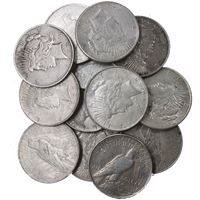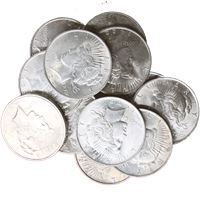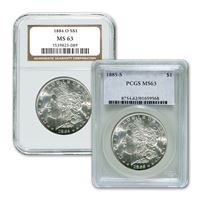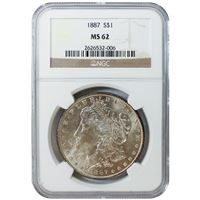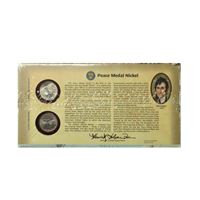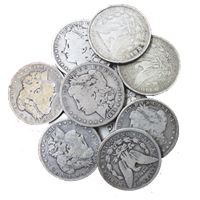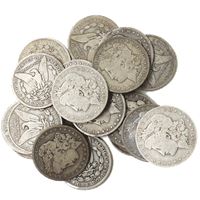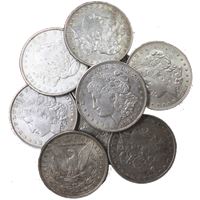How Much Is A Silver Dollar Worth?
Many factors influence how much a silver dollar is worth. These little details can make a huge difference! For example, some common silver dollars are worth as little as $20, while others are worth thousands of dollars.
There were also a wide variety of different types of silver dollars made in the United States over the past three centuries. With so many different designs to choose from, figuring out which one you have is the first step.
This article will help you identify what kind of silver dollar you have with photographs for reference. It will also show you how to determine the four key factors below by simply looking at your coin.
The value of a silver dollar depends on several factors, including:
- its age;
- its condition;
- its origins; and
- whether or not it's an unusual variety or error coin.
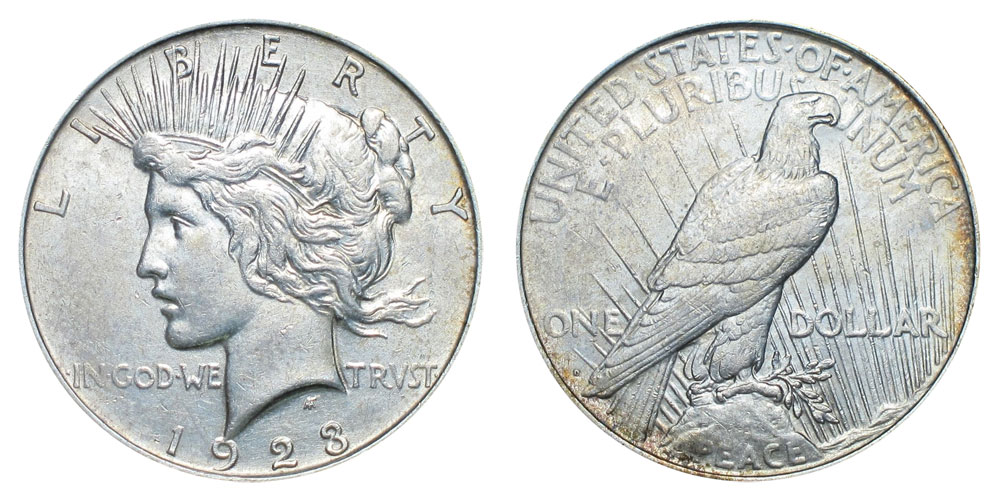
Peace dollars are still popular among coin collectors.
P.S. -- Want to listen to this post?
The values of your specific silver dollars can only really be determined by a sight-seen evaluation by a professional coin dealer. Yet you can at least become more educated about what your silver dollars may be worth by knowing some of the basics about them and how these coins are numismatically valued.
What Type of Silver Dollar Do You Have?
This is one of the most important questions you need to answer before you can even begin to have a grasp on what your coins are worth. It will save you money next time you decide to sell or buy silver dollars.
As many numismatists know, there isn’t “a” single type of silver dollar, but in fact many types. Here’s a rundown on the various major types of silver dollars that have been struck since the United States Mint began making them in 1794:
Flowing Hair Dollar (1794–95)
VALUE: $1,787 – $1,555,005
Draped Bust Dollar (1795–1804)
VALUE: $1,537 – $1,238,926
Gobrecht Dollar (1836–1839)
VALUE: $12,895 – $73,561
Liberty Seated Dollar (1840–1873)
VALUE: $267 – $73,563
Trade Dollar (1873–1885)
VALUE: $106 – $31,507
Morgan Dollar (1878–1921)
VALUE: $32 – $614,348
Peace Dollar (1921–1935)
VALUE: $30 – $130,940
Eisenhower Dollar (1971–1978)
VALUE: $1 – $104
Commemorative Dollars (1983–present)
VALUE: $20 – $400
American Silver Eagle One Dollar (1986–present)
VALUE: $35 – $3,443
Chances are, if you have any silver dollars, they’re probably among the last five on this list.
While those last five types are the most common of all silver dollars, that doesn’t mean if you have any of those that they are not worth anything. In fact, all dollar coins containing silver are worth multiples over their face value. But by how much? Read on to learn what makes a silver dollar valuable!
Four Keys to Silver Dollar Values
There’s a lot more to determining the value of a silver dollar than simply looking up the date online at a few websites or eBay and simply assuming yours is worth the highest—or lowest—price. There are several important factors to determining how much your silver dollar is worth. These include:
- The date – Yes, the date is an important factor in knowing how much your silver dollar is worth. But it's not the only thing to look for. . .
- Its mintmark – Where the coin was minted makes or breaks everything about the value of your silver dollar, and the mintmark indicates the coin's origin.
- Errors and varieties – Does your coin look unusual? It may be due to an error or neat die variety, and these can be worth big bucks.
- The grade & overall condition – An uncirculated silver dollar never used as money will be worth much more than one of the same date and mintmark combination that is nearly worn smooth. Don't forget, cleaned or otherwise damaged silver dollars are worth only a fraction of the values you see in the books or online.
Getting the Date
Look on your silver dollar. . . You’ll find the date on the obverse, or “head’s side,” of the coin.
While it may make sense to some to think that the older dates are worth more than more recent dates, this isn’t always true. Yes, the 1804 dollar brings millions, but not necessarily because it’s old. Rather, it’s because just 15 were minted and therefore are quite rare.
Some dates have higher numbers of survivors than others. The relatively high-mintage 1879 Philadelphia Mint Morgan dollar is worth perhaps $15 to $30 in well-circulated grades, while the low-mintage 1928 Philly-minted Peace dollar can take $200 or more in the same condition. Value really has nothing to do with relative age—it’s about the rarity of the date.
Bottom Line:
The date on a silver dollar is important because it will generally tell you how rare the coin is.
Mintmark
Sometimes, folks who don’t really know what to look for on silver dollars will understandably examine the date alone and say they have “the” so-and-such date silver dollar. The problem is there is another major equation to identifying a silver dollar, and it’s not just looking at the date but also the mintmark, if any is on the coin, indicating where that silver dollar was made.
Before the 1840s, all silver dollars were minted at the Philadelphia Mint and did not have mintmarks—a single letter or sometimes two letters indicating where the coin was made.
Silver dollars have been made at the following mints:
- Carson City – Denoted by a "CC"
- Denver – Indicated by a "D"
- New Orleans – Bearing the single letter "O"
- Philadelphia – No mintmark on dollar coins until 1979, when the "P" mintmark was used
- San Francisco – Carries an "S" mintmark
- West Point – Accompanied by a "W" mintmark
Every type of silver dollar will have the mintmark in a different place, but generally on all silver dollars made before the Eisenhower dollar it appears on the reverse (“tail’s side”). On Eisenhower dollars and other dollar coins made since, it will be found on the obverse—with the exception of some modern small-size golden dollars, on which the mintmark sometimes appears on the edge of the coin.
Bottom Line:
The mintmark tells us where a silver dollar coin was made. This can have an impact on the coin's value.
Errors and Varieties
Before you go bananas looking for coins that have unusual markings or other odd things about them, bear this in mind: many, if not most, things often thought by non-expert numismatists to be errors or varieties are simply post-mint damage.
It’s surely understandable to get excited about weird dents, strange-looking gouges, or even odd markings (such as Masonic symbols) on your coins, but these are virtually always caused by someone or something outside the mint and in most cases will reduce the value of the coin, not increase it.
There are, however, many types of errors and die varieties that can increase the value of your silver dollars and it would behoove you to research these and learn how to spot them on your coins.
Bottom Line:
You should do research about a coin in order to determine if it is an error coin or a rare variety.
The Grade & Overall Condition
New collectors, here’s your first piece of advice on anything having to do with the condition of your coins: do not clean them under any circumstances! Cleaning your coins will not make them look any better and, unless done by a professional coin conservation firm, will always reduce its value—perhaps by 50% or even more.
Coin dealers and seasoned numismatists prefer their coins original, not cleaned, in part because cleaning your coins removes all of the acquired patina and even a very thin layer of metal that can never be repaired or restored. So, be sure to leave your coins as you found them!
There are many other aspects of a coin’s condition that are important to know as you determine the value of your silver dollar, including its wear-based grade.
Coin grading is a very complex area of numismatics, one that takes years to really learn and understand like the back of your hands. It surely can’t be taught here in a couple paragraphs.
But, what’s important to know is that coins are graded on a 70-point scale, with “1” indicating a coin in poor condition—worn nearly smooth—and “70” denoting a coin that’s never been spent as money and is virtually perfect, with no visible nicks, scratches, or other marks.
A coin that’s never been spent as money and has all of its details intact is known to be in uncirculated grade, and this is generally the most valuable condition in which a coin is found. Grading coins based on the amount of wear is a nuanced part of numismatic knowledge and something with which you should familiarize yourself.
Bottom Line:
The more wear and tear on a coin, the lower its grade. Don't attempt to clean a coin yourself.
How Much Is a Silver Dollar Worth?
There are so many value guides both online and in print, it can sometimes be confusing to figure out precisely how much your coin is worth. Sure, you may have seen that a 1922 silver dollar much like yours sold for $3,000 on eBay, but is that what yours is worth?
Maybe you recently saw a story about the 1804 silver dollar going for millions of dollars. . . So, if that coin took $5 million, does that mean your old silver dollars from the 1880s or 1890s are worth, say, a tenth of that amount because they’re not quite as old? The older the silver dollar, the more it’s worth—right?
These are all legitimate questions, especially for someone who may be completely unaware of the intricacies of the complex and ever-changing coin marketplace.
Bottom Line:
The marketplace for coins is always changing. The value of a silver dollar depends on several factors, such as its date, mintmark, condition, and any potential errors.
Morgan and Peace Dollars
If you own any common Morgan or Peace silver dollars that are in worn condition, these are usually worth very close to the current price of an ounce of silver. Rarities or those in exceptionally good condition can be worth hundreds or even thousands of dollars.
If any of your Morgan dollars bear a “CC” mintmark under the eagle on the reverse, then they’re worth at least $50 to $100 each, maybe more. And while all 1921 Morgan dollars are common, the 1921 Peace dollar is scarce, with most worth at least $50 or more.
Again, there are many circumstances like these in which one or two variations between coins of the same date can mean a piece that might buy you lunch versus one that will help pay off your mortgage.
Bottom Line:
The mintmark and condition of a Morgan silver dollar or Peace silver dollar will help determine how much it is worth.
Eisenhower Dollars
Got a bunch of Eisenhower silver dollars you want to sell? Unfortunately, most Eisenhower dollars aren’t even silver at all but rather made from a base-metal composition containing copper and nickel. When worn, these are worth only face value, so it’s safe to simply spend them or maybe give them to some children who might find these large dollar coins fascinating novelties.
Aside from extremely rare errors, all Eisenhower dollars with silver must contain an “S” mintmark, and even then only a portion of those are actually made from silver. Unless you know your Eisenhower silver dollars well, you may want to take your S-mint Eisenhower dollars to a numismatic professional who can tell you which are made from a silver composition.
Bottom Line:
All Eisenhower dollars made of silver will have an "S" mintmark; BUT not all Eisenhower dollars with an "S" mintmark will be made of silver.
Other Dollar Coins
Have any Susan B. Anthony dollars (seen above)? Virtually all that are worn are worth only face value, so it’s generally safe to spend those, too.
And those “golden” dollars (seen below) aren’t made from gold, nor are they rare. They can be spent along with your worn Susan B. Anthony dollars and Eisenhower dollars.
The American Silver Eagle dollars contain a full ounce of silver and are worth roughly the current value of one ounce of silver; these are worth selling if you wish to let go of the ones you have.
For a better idea of what Silver Eagles are worth, view the product listings on our American Silver Eagles category page.
All commemorative silver dollars made since 1983 contain very close to an ounce of silver and are also worth selling if you don’t wish to keep them.
Have any of the really old silver dollars listed above, such as the Flowing Hair, Draped Bust, Gobrecht, Liberty Seated, or Trade dollars? These coins are worth significantly more than most Morgan or Peace dollars and are worthy of taking to your local coin dealer so you can find out what those specific pieces are worth.
Bottom Line:
There have been many different dollar coins throughout American history. Be sure you know what kind you have before jumping to conclusions about its value.
Collecting Silver Dollars Can Become a Hobby
Whether your silver dollars are worth a little or a lot, hopefully they bring you joy and perhaps inspire you to collect more coins.
Even if you inherited your silver dollars from a loved one, perhaps your introduction to coins may inspire you to further build upon the collection you now have.
Coin collecting is a fantastic hobby that can be enjoyed for a lifetime, bringing you great financial and personal fulfillment along your numismatic journey.
Do you want to sell silver dollars? Follow the link to get an offer from Gainesville Coins!
You can also shop for silver dollars from the selection of products for sale below.
Joshua McMorrow-Hernandez is a journalist, editor, and blogger who has won multiple awards from the Numismatic Literary Guild. He has also authored numerous books, including works profiling the history of the United States Mint and United States coinage.
More coin expert articles from the author:
Top 15 Best Coins to Collect: A Definitive List
How Valuable Are Eisenhower Silver Dollars?
Silver Eagle Values - Complete Pricing Guide
Susan B. Anthony Dollar: Values and Series Rundown
Silver Coins vs. Silver Bars: Which Is the Better Buy?
Best Place to Buy Gold in 2023
product

